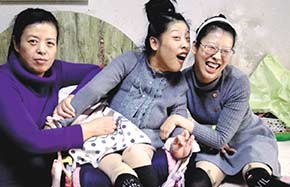New national legislature sees more diversity
BEIJING?-?More migrant workers and women, as well as younger people, have been elected to the 12th National People's Congress (NPC), China's national legislature, while fewer government and Party officials have won places.
The 11th NPC Standing Committee confirmed on Wednesday the credentials of all 2,987 elected deputies.
The number of farmers-turned migrant workers elected to the 12th NPC has notably increased.
A total of 401 workers and farmers have been elected deputies. They comprise 13.42 percent of the total, up 5.18 percentage points from the 11th NPC, the Standing Committee announced.
The younger generation has also entered the national legislature, with two deputies born after 1990 and 74 born after 1980.
Chen Ruolin, the youngest deputy, was born in December 1992. She won a gold medal in the women's synchronized 10-meter platform diving competition at the London Olympic Games in 2012.
Tie Feiyan, also born in 1992, is a road toll collector in southwest China's Yunnan province. Chinese netizens hailed her as "the most beautiful girl born after 1990," as she once rescued people from drowning and has adopted an abandoned infant.
The number of female deputies has risen to 699, accounting for 23.4 percent of the total. The proportion rose 2.07 percentage points from a year earlier.
Moreover, 1,042, or 34.88 percent of the 12th NPC deputies, are government officials and leading Party cadres, down 6.93 percentage points from the 11th NPC.
Such a decrease will help to "improve the representation of the people, motivate political participation at grass-roots levels, nurture more practical government decisions and better reflect the people's will, wishes and interests," said Xue Qingchao, researcher with the Party History Research Center of the Communist Party of China Central Committee.
All the deputies were elected from 35 election units representing 34 Chinese regions and the People's Liberation Army in December and January.
The biggest difference between this election and previous elections is that deputies were elected this year using the same population ratio for both rural and urban areas, said Wang Wanbin, deputy secretary general of the NPC Standing Committee.
Each rural NPC deputy used to represent a population eight times that of an urban deputy between the 1950s and the 1990s, when the country had a dominating rural population.
Thanks to fast urbanization, the representation ratio reduced to four after the Electoral Law was revised in 1995 and remained the same under the 2010 amendment.
This change helps to spread the notion of upholding equality during elections, according to Han Dayuan, dean of the Law School of Renmin University of China.
"It will contribute to the country's rural-urban integration, greatly encourage farmers' political participation and speed up the development of democracy. It may also help push forward reform in the household registration system," Han added.
This election has also stressed equality among different ethnic groups.
According to the 11th NPC Standing Committee, 409, or 13.69 percent of the newly elected deputies, are from the country's 55 ethnic minority groups, with each of these groups represented.

























